My top ten for 2013 is:
- Blue Is the Warmest Color
- The Hunt
- Before Midnight
- Stories We Tell
- The Spectacular Now
- Mud
- Short Term 12
- Fruitvale Station
- The Act of Killing
- Captain Phillips.
The other best films of the year are: The Great Beauty, Nebraska, American Hustle, Her, The Past, Ain’t Them Bodies Saints, Rendez-vous in Kiruna, The Gatekeepers, At Any Price, Undefeated, In a World… and Me And You.
Note: Undefeated is on this year’s list, even though it won an Oscar a year ago, because it only became available for most of us to see in 2013.
BLUE IS THE WARMEST COLOR: a stunning exploration of first love

The French drama Blue is the Warmest Color explores first love, capturing the arc of a young woman’s first serious romance with remarkable authenticity and a stunning performance by 19-year-old actress Adèle Exarchopoulos. Exarchopoulos plays a 17-year-old (also named Adèle) who falls in love with an out lesbian five or six years her senior. The film traces the course of their relationship over the next several years as the couple are challenged by jealousies and their different temperaments and class backgrounds, and as Adèle matures.
The acting is excellent, including Léa Seydoux (Farewell My Queen, Midnight in Paris) as the lover. But Adèle Exarchopoulos is a revelation. She is perfect as a teen typically full of curiosity and devoid of confidence, outwardly raunchy but profoundly innocent. And she has an extraordinary gift to seem utterly alone in a crowd. After watching Exarchopoulos, I felt as I did after seeing Jennifer Lawrence in Winter’s Bone – I can’t wait to see this emerging major talent again.
This is the first film I’ve seen by Tunisian-born French director Abdelatif Kechiche, who has twice before won the Cesar (the French Oscar). In Blue Is the Warmest Color, Kechiche uses the closeup more than any recent director that I can recall, and he is fortunate to have Exarchopoulos, who can pull it off. It’s an excellent reason to see Blue Is the Warmest Color on the big screen.
Blue Is the Warmest Color is three-hours long, which is an indulgent length, but not too long. I am usually impatient with movies over two hours and quick to find them overlong. But Blue Is the Warmest Color kept my interest and engagement for its duration, and I really couldn’t recommend many cuts.
There is a LOT of explicit simulated sex in this movie. The main characters’ first love scene must sample the entire lesbian Kama Sutra. That scene, reputed by some to last nineteen or twenty minutes, didn’t seem that nearly long. The film proudly earns its NC-17 rating by depicting the (apparently very satisfying) sexual aspect of a romance.
But, in the end, it’s all about Adèle’s romance and Exarchopoulos’ performance. Blue Is the Warmest Color won the top prize at Cannes, and is one of the year’s best films – perhaps the very best.
THE HUNT: terrifyingly plausible
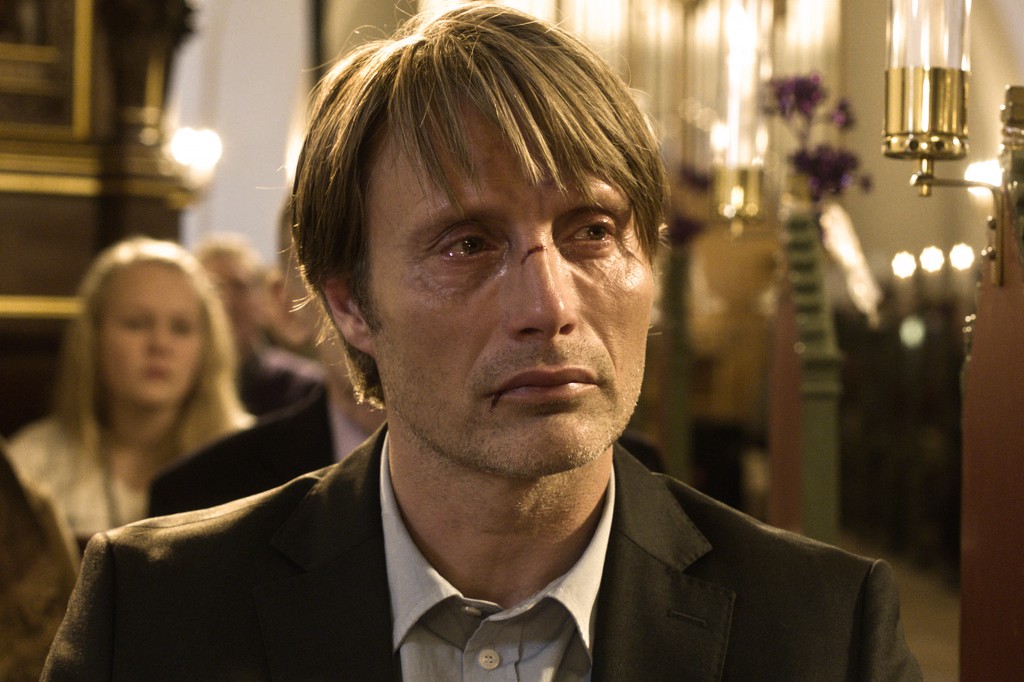
In the Danish drama The Hunt (Jagten), Mads Mikkelsen plays a man whose life is ruined by a false claim of child sexual abuse. You’ll recognize Mikkelsen, a big star in Europe, from After the Wedding and the 2006 Casino Royale (he was the villain with the bleeding eye). He won the 2012 Cannes Best Actor award for this performance.
The story is terrifyingly plausible. The protagonist, Lucas, is getting his bearings after a job change and a divorce. He lives in a small Danish town where everyone knows everyone else, next door to his best friend. The best friend drinks too much and his wife is a little high-strung, but Lucas embraces them for who they are. He’s a regular guy who hunts and drinks with his buddies and is adored by the kids at the kindergarten where he works. He’s not a saint – his ex-wife can get him to fly off the handle with little effort.
A little girl hears a sexual reference at home that she does not understand (and no one in the story could ever find out how she heard it). When she innocently repeats it at school, the staff is alarmed and starts to investigate. Except for one mistake by the school principal, everyone in the story acts reasonably. One step in the process builds upon another until the town’s parents become so understandably upset that a public hysteria ensues.
Director Thomas Vinterburg had previously created the underappreciated Celebration (Festen). The Hunt is gripping – we’re on the edges of our seats as the investigation snowballs and Lucas is put at risk of losing everything – his reputation, his job, his child, his friends, his liberty and even his life. Can Lucas be cleared, and, if he is, how scarred will he be? The Hunt is a superbly crafted film with a magnificent performance by Mikkelsen.
BEFORE MIDNIGHT: the best romance in nine years
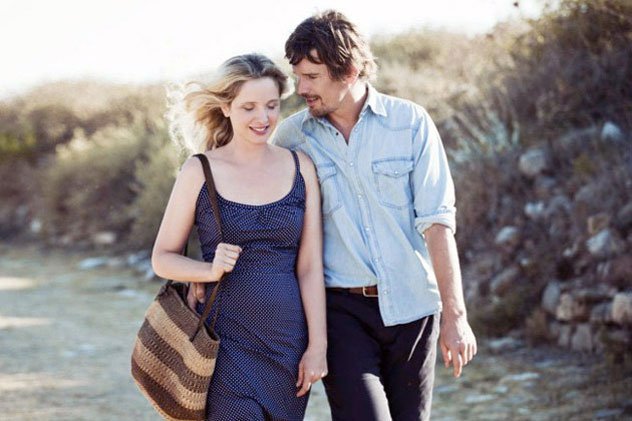
In 1995’s Before Sunrise, Jesse (Ethan Hawke) is an American writer in his early twenties who meets a French woman, Celine (Julie Delpy), on a train and talks her into walking around Vienna with him before his early morning flight back home. They banter and flirt, sparks fly and they agree to meet in six months. We find out what happened nine years later when they encounter each other again in Paris in Before Sunset. Now, in Before Midnight, it’s been another nine years and Jesse and Celine are 41. Their journeys have reached another stage, and we meet them in a Greek coastal resort.
In the first two movies, we were rooting for them to get together, but didn’t know whether it would happen. Now we know – they are a couple. The arcs of their careers have intersected, they face the roles of parent and step-parent and their attraction and feelings for each other have matured. As do all couples, they must negotiate each other’s expectations, desires, temperaments and quirks – with a combination of deliberation, accommodation, manipulation and argument.
All three movies in the series are deeply affecting because they are unusually authentic movie romances. The tension in the first two movies is what will happen when they fall in love. The tension in Before Midnight is whether – and how – they will stay in love. Jesse and Celine are perfect for each other – but is that enough?
Before Midnight is co-written by director Richard Linklater and stars Hawke and Delpy. Once again, we have a movie romance without the tired conventions of more superficial romantic comedies; in this series, there are no goofy best friends/roommates, obnoxiously intrusive parents – and no weddings. Instead, we have two attractive, intelligent and very verbal people who are very funny, and have potentially conflicting needs.
The series, which develops the same characters over eighteen years, is a very impressive work and Before Midnight is the year’s best romance (and one of the year’s best movies).
STORIES WE TELL: when life surprises..and we how explain it
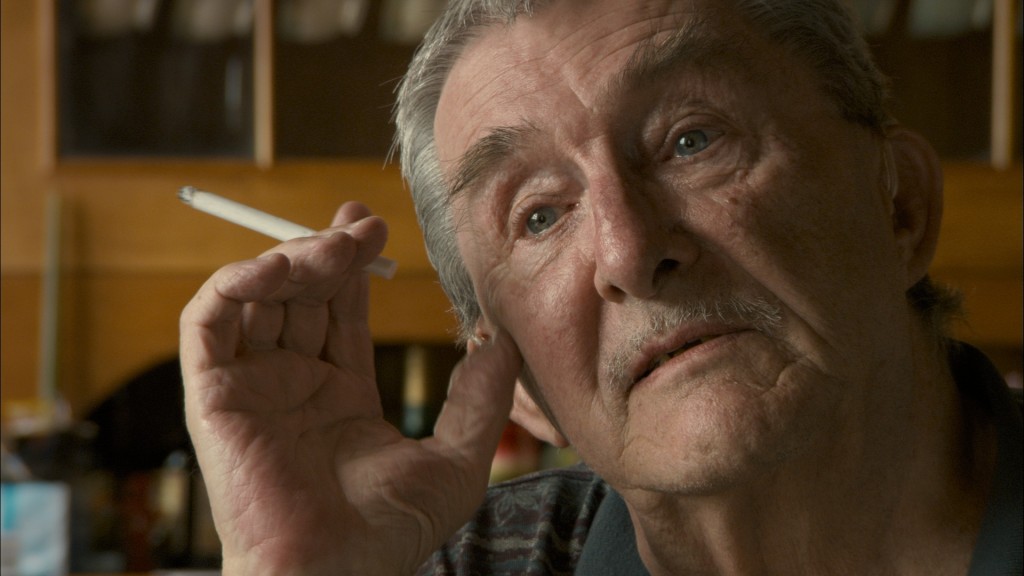
Stories We Tell is the third film from brilliant young Canadian director Sarah Polley (Away From Her, Take This Waltz), a documentary in which she interviews members of her own family about her mother, who died when Sarah was 11. It doesn’t take long before Sarah uncovers a major surprise about her own life. And then she steps into an even bigger surprise about the first surprise. And then there’s a completely unexpected reaction by Polley’s father Michael.
There are surprises aplenty in the Polley family saga, but how folks react to the discoveries is just as interesting. It helps that everyone in the Polley family has a deliciously wicked sense of humor.
The family story is compelling enough, but Polley also explores story telling itself. Everyone who knew Polley’s mother tells her story from a different perspective. But we can weave together the often conflicting versions into what seems like a pretty complete portrait of a complicated person.
Polley adds more layers of meaning and ties the material together by filming herself recording her father reading his version of the story – his memoir serves as the unifying narration.
To take us back to the 1960s, Polley uses one-third actual home movies and two-thirds recreations (with actors) shot on Super 8 film. Polley hired cinematographer Iris Ng after seeing Ng’s 5 minute Super 8 short. The most haunting clip is a real one, a video of the actress Mom’s audition for a 60s Canadian TV show.
Make sure that you stay for the end credits – there’s one more surprise, and it’s hilarious.
MUD: a big dose of realism about love
In the brilliant drama Mud, two Arkansas boys venture onto a river island and discover a man named Mud (Michael McConaughey) hiding from the authorities. Ellis (Tye Sheridan of The Tree of Life) is a hopeless romantic, consumed by an ideal view of love. His more hard-eyed buddy Neckbone (Jacob Lofland) is on the outlook for cool stuff. Both are ready for the excitement of a secret adventure.
Mud is another triumph for writer-director Jeff Nichols (Shotgun Stories, Take Shelter). The story has aspects of a boyhood adventure and of an escape thriller which hook the audience. But Mud is, at its heart, a coming of age story in which Ellis (primarily) gets a big dose of realism about love and human constancy.
Neckbone doesn’t have many illusions about human nature. His parents aren’t in the picture, and he lives with his wacky uncle Galen (Michael Shannon) in a trailer. Neckbone has a knack for immediately getting to the core of situation by bargaining an errand for a pistol or asking “Didja feel her titties?”.
A step down from Neckbone’s trailer lifestyle, Ellis lives on a floating shack tied to the riverbank. His parents are together, but, it seems, not for long. Somehow, Ellis believes in an ideal and forever love. There are many relationships for Ellis to observe: his parents’ troubled journey, the sacrifices Mud makes for his lover (Reese Witherspoon), the mysterious relationship between Mud and another houseboat dweller (Sam Shepherd), a rich man’s (Joe Don Baker) own obsession with his sons, his partnership with Neckbone and Ellis’ own first foray into dating. It’s all a bigger mouthful than Ellis was expecting.
The two kid actors are great. So are McConaughey, Shepherd, Witherspoon, Baker and Nichol’s favorite actor, Shannon. Mud primarily succeeds because Nichols has created compelling characters and woven a top-rate story, both gripping and thoughtful. Mud is one of the best movies of 2013.
SHORT TERM 12: a Kid Whisperer with her own troubles
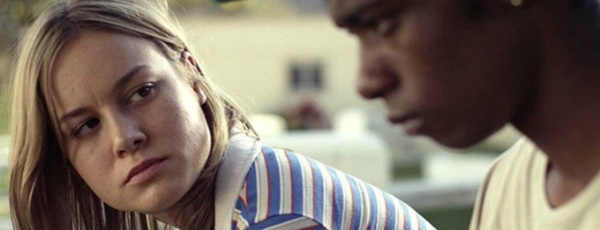
The compelling and affecting Short Term 12 is set in a foster care facility unit named Short Term 12; since the kids can live there for years, it seems pretty long-term to me. These are kids who have suffered abuse and neglect and who act out with disruptive and dangerous behaviors. Runaways, assaults and suicide attempts are commonplace, and some of the kids thrive on creating drama.
The gifted lead counselor on the unit is Grace (Brie Larson), who isn’t much older than the kids. She’s kind of a Troubled Kid Whisperer who, in each impossible situation, knows exactly what to do to defuse or comfort or protect. But while she is in total command of her volatile and fragile charges, she is profoundly troubled herself. She and her boyfriend Mason (John Gallagher Jr.), who also works on the unit, are themselves survivors and former foster youth. Mason seems to have resolved his issues, but Grace’s demons lurk just under her skin.
In Short Term 12’s taut 96 minutes, we watch Grace navigate through crisis after crisis until she must face her own. We share many of the most powerful moments in 2013 cinema, particularly one kid’s unexpectedly painful insightful and sensitive rap, another kid’s authoring a wrenching children’s story and Grace’s own outburst of ferocity to protect a kid from a parent.
Brie Larson’s performance as Grace is being widely and justifiably described as star-making, and I think she deserves an Oscar nomination. I noticed her performances in much smaller roles in Rampart and The Spectacular Now , and I’m really looking forward to the launch of a major career. Think Jennifer Lawrence.
John Gallagher Jr. must be a superb actor, because nobody in real life can be as appealing and sympathetic as his characters in Margaret, Newsroom and Short Term 12. I’ll watch any movie with Gallagher in it, and he’s almost good enough to help me stomach Newsroom.
In his debut feature, writer-director Destin Cretton has hit a home run with one of the year’s best dramas. Some might find the hopeful ending too pat, but I say So What – I have met many former foster youth who have transcended horrific childhoods to become exemplary adults.
FRUITVALE STATION: the human moments that define a life
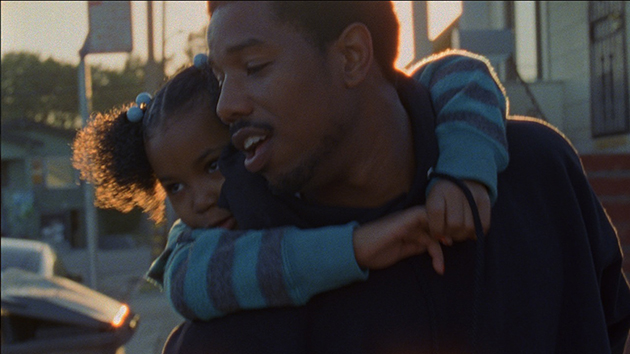
The emotionally powerful Fruitvale Station explores the humanity behind the news. If, as I do, you live in the San Francisco Bay Area, you know what happened to Oscar Grant. Returning to the East Bay after 2008 New Year’s Eve revelries in San Francisco, the unarmed 22-year-old was handcuffed and lying on his stomach when he was mortally wounded by a transit cop’s gunshot. Oscar Grant was African-American. The transit cop was white. Multiple cell phone videos of the incident went viral on New Year’s Day. Fruitvale Station opens with one of those shaky videos.
But the beauty and strength of this impressive film is that Fruitvale Station is not about the incident and its political fallout – it’s about the people involved, in their workaday and familial roles to which all of us can relate. It follows the fictionalized life of Oscar Grant as he lives out what he doesn’t know is his last day.
Writer-director Ryan Coogler’s Oscar Grant is a complete and textured character. Oscar is a charming guy, a loving father and the fun dad/uncle who children love roughhousing with. He’s remarkably unreliable as a boyfriend, son and employee. He’s done a stretch in San Quentin, and he’s got a temper. He’s capable of random acts of kindness. He’s a complete package of decency, fecklessness, irresponsibility and possibilities. Would he have turned his life around if he hadn’t been at Fruitvale Station that night? We’ll never know. And that’s the tragedy laid bare by Fruitvale Station.
Although it’s a tragedy with some heartbreaking moments, Fruitvale Station isn’t a downer – it’s too full of humanity for that. Neither is it a political screed; Coogler lets the facts speak for themselves and the audience to draw its conclusions.
The acting is first-rate, especially Michael B. Jordan as Oscar, Melonie Diaz as his girlfriend and the great Octavia Spencer as his mom. Equally, important, the supporting cast is just as authentic.
It’s a stunning debut feature for 27-year-old filmmaker Ryan Coogler, from whom much is now expected. (Coogler is also an African-American from the East Bay who is roughly the same age as Oscar Grant.)
Fruitvale Station was justifiably honored at both the Sundance and Cannes film festivals. It’s one of the best movies of 2013.
THE ACT OF KILLING: the banality of evil like you’ve never seen it

Okay, here’s a jaw dropper. In the chilling documentary The Act of Killing, perpetrators of genocide in Indonesia are asked to re-enact their murders – and they are pleased as punch to do so. We meet unapologetic mass murderers face-to-face. Filmmaker Joshua Oppenheimer has created the year’s most startling documentary.
After the 1965 military coup, death squads sympathetic to the military labeling opponents of the regime, landless farmers and ethnic Chinese as “communists” – and killed 2-3 million fellow Indonesians. The killers were mostly Indonesian paramilitary groups and gangsters. The Act of Killing introduces us to several of these murderers, who don’t try to evade or spin their deeds, but instead look proudly and nostalgically at their murders as the highlight of their lives.
The film primarily focuses on two self-described gangsters, Anwars and Herman. The two enthusiastically embrace the film project so they can document their murders for history. Anwars is said to have killed a thousand by himself. Because beating them to death produced too much messy blood, he devised a method of strangling them with wire. The corpulent Herman chooses spends about a third of movie dressed in flamboyant drag, which is ridiculous, but the film is so disturbing that the audience just can’t laugh. Besides acting out interrogation torture murders and a village massacre, the two come up with a Bollywood-like musical number of Born Free, complete with dancing-girls in front of a waterfall, in which the garotted dead reappear to thank Anwars for sending them on to the afterlife. It is beyond bizarre.
In the film’s most riveting scene, a guy who has been recruited to play a torture victim in the film-within-a-film, recounts the death squad murder of his step-father to Anwars and Herman. To keep his composure, he awkwardly laughs as he describes the abduction – but his eyes are clearly blaming the old gangsters. Then he acts out his torture for the camera.
The Act of Killing is hypnotically compelling – you can’t believe what’s on the screen, can’t believe that you’re still watching it and can’t stop watching.
The Act of Killing is directed by Oppenheimer and co-directed by someone credited as “Anonymous” and Christine Cynn. Oddly, there is no writing credit. The great documentarians Errol Morris and Werner Herzog are among the executive producers.
[We don’t often explore genocide from the perpetrator’s point of view, although two excellent documentaries come to mind: Shoah and Blind Spot: Hitler’s Secretary, both on my 5 Essential Holocaust Films. The current film Hannah Arendt is about the academic theorist who coined the term “banality of evil”, but that story’s duel of letters between hand-wringing intellectuals makes for a stale discussion.]
The Act of Killing is a very uncomfortable movie, and I suspect that it wouldn’t be not a great choice for most of my readers. But it pushes the envelope of cinema and is the most uniquely original film of the year (or millennium so far?). I’m really glad that I watched it.
CAPTAIN PHILLIPS: flawless true life thriller
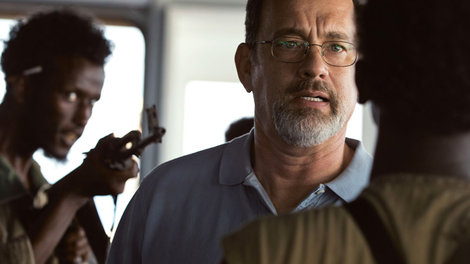 In Captain Phillips, Tom Hanks stars as the real-life ship captain hijacked by Somali pirates and rescued by American commandos in 2009. The real-life Phillips survived his terrifying ordeal with guts and smarts, and Hanks and director Paul Greengrass bring the story alive. Greengrass is an old hand at movies with urgency and tension: Bloody Sunday, two movies in the Bourne franchise and an Oscar nomination for United 93.
In Captain Phillips, Tom Hanks stars as the real-life ship captain hijacked by Somali pirates and rescued by American commandos in 2009. The real-life Phillips survived his terrifying ordeal with guts and smarts, and Hanks and director Paul Greengrass bring the story alive. Greengrass is an old hand at movies with urgency and tension: Bloody Sunday, two movies in the Bourne franchise and an Oscar nomination for United 93.
Another key is that Captain Phillips was shot on the high seas on an actual container ship, an actual lifeboat and a skiff just like the real pirates use. As a result, it’s amazingly real when the pirates clamber up the side of the massive ship while both vessels roll in the waves and when the seamen and pirates play hide-and-go-seek below decks in the dark.
That being said, the movie wouldn’t work without Tom Hanks, who is unsurpassed at playing an Everyman thrust into a perilous situation. Hanks is our generation’s Jimmy Stewart, and I can see Hanks playing Stewart’s roles in Rear Window, Vertigo, Anatomy of a Murder and The Man Who Shot Liberty Valance.
Most of the pirates are standard types, but the lead pirate is a much more textured character, superbly played by Barkad Abdi, hitherto a Somali-American limo driver from Minneapolis. The depth in Abdi’s performance is also essential to the film’s success. The cast also features character actor Michael Chernus, so good in Higher Ground and Men in Black 3, as the #2 on the ship.
All in all, Captain Phillips is a flawless true story thriller.
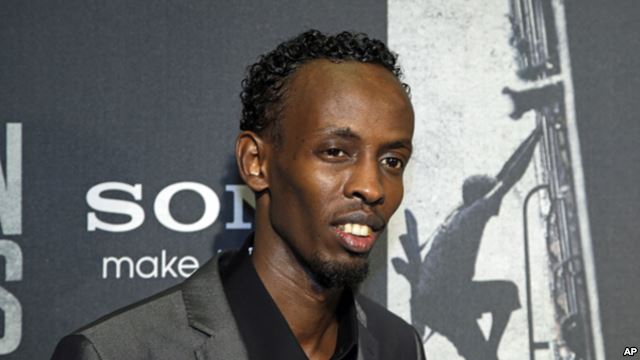
THE GREAT BEAUTY: decadence, stunning imagery and the beauties of Rome itself
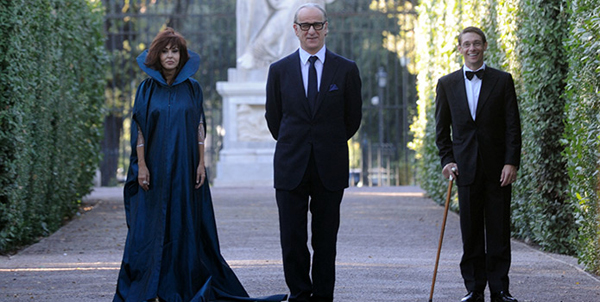 As The Great Beauty (La grande belleza) begins, its protagonist Gep Gambardella is celebrating his 65th birthday in a feverishly hedonistic party. Gep authored a successful novel in his twenties, which has since allowed him the indulgent life of a celebrity journalist, bobbing from party to party among Rome’s shallow rich. Gep is having a helluva time, but now he reflects on the emptiness of his milieu and the superficial accomplishments of his past 40 years. As he alternates introspection and indulgence, we follow him through a series of strikingly beautiful Roman settings. (And, because Gep parties all night, we see lots of gorgeously still Roman dawns.)
As The Great Beauty (La grande belleza) begins, its protagonist Gep Gambardella is celebrating his 65th birthday in a feverishly hedonistic party. Gep authored a successful novel in his twenties, which has since allowed him the indulgent life of a celebrity journalist, bobbing from party to party among Rome’s shallow rich. Gep is having a helluva time, but now he reflects on the emptiness of his milieu and the superficial accomplishments of his past 40 years. As he alternates introspection and indulgence, we follow him through a series of strikingly beautiful Roman settings. (And, because Gep parties all night, we see lots of gorgeously still Roman dawns.)
The Great Beauty is foremost an extraordinarily beautiful art film. If you’ve been to Rome, you know that it is a generally chaotic city with unexpected islands of solitude. The Great Beauty captures this aspect of the Eternal City better than any other film I’ve seen. On one level, The Great Beauty is very successful Rome porn.
Writer-director Paolo Sorrentino also explores the moral vacuity of the very rich and the party life. It’s the Italy of Silvio Berlusconi, whom Sorrentino blames for enabling a national culture of escapism. These themes, along with the main character and the movie’s structure are of course nearly identical to Fellini’s great La Dolce Vita (1960), but The Great Beauty is more accessible, funnier and a bit more hopeful – and much more of a showcase for the cityscape of Rome. Sorrentino provides plenty of laughs, especially with a gourmet-obsessed cardinal and a cadaverous celebrity nun with a Mephistopheles-looking handler.
It’s hard to imagine an actor better suited to play Gep than Toni Servillo. Servillo perfectly captures both the happiness Gep takes in carnal pleasure and his self-criticism for giving his entire life to it. Servillo’s Gep is brazenly proud of his own cynicism, until we see his humanity breaking through at a funeral. Servillo is even magnificent in wearing Gep’s impressive collection of sports jackets.
There’s so much to The Great Beauty – stunning imagery, introspection, social criticism, sexual decadence, fine performances, humor and a Rome travelogue – each by itself worth a visit to the theater. The Great Beauty, which will be one of the favorites for the Best Foreign Language Oscar, may not be in theaters for very long – catch it while you can.
NEBRASKA: coming to terms with an unfulfilled life
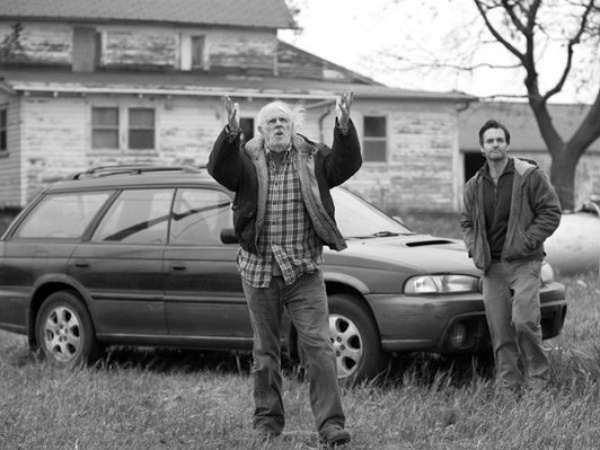
In the funny, poignant and thought-provoking Nebraska, a Montana geezer named Woody (Bruce Dern) gets a sweepstakes come on in the mail and believes that he has actually won a million dollars. Unwilling to accept the explanations from his loved ones, Woody is determined to get to Omaha to claim his fortune – by walking if necessary. His son David (Will Forte from Saturday Night Live) decides to drive him, and their journey takes them through Woody’s tiny Nebraska hometown.
At first, we see that Woody is bitter, drinks too much, is sometimes addled and drives his loved ones crazy. As the story progresses, we learn that Woody’s bitterness is rooted in frustration of his modest aspirations by both circumstance and by his own shortcomings. And we see David longing for a relationship with his father that he had never thought possible before. David makes a valiant effort, but Woody is long past any sentimentality. In Nebraska, director Alexander Payne (Sideways, The Descendants) has another triumph of endearingly flawed characters.
There are many laughs in Nebraska, the funniest coming from Woody’s wife’s salty exasperation, David’s repellant cousins and the hilarious theft of a generator.
The acting is outstanding. Bruce Dern will certainly – and deservedly – get an Oscar nomination. It’s a character that is revealed to be more and more complex. Is he demented, or is he in denial, or is he lying? Some of each for sure, but it’s always hard to tell. Dern has stated that he called upon his own experience with unsupportive parents to play the film’s most searing scene, in which David takes a reluctant Woody back to see Woody’s now abandoned childhood home. June Squibb, who play’s Woody’s wife, has also been mentioned for an Oscar nod; indeed, she gets to deliver most of the funniest lines.
But there are two other exceptional performances that I don’t want to overlook. As the son, Will Forte plays Woody’s straight man. It’s a far less flashy role – and perhaps more challenging role. But Forte lets us see past the son’s stoicism to his pain, embarrassment, frustration, determination and love.
And Actress Angela McEwan has the tiny part of the small town newspaper publisher. She just gets one brief exchange with Forte and then a second scene where she looks at a truck driving past. That look is one of the unforgettable moment in cinema this year.
Finally, my parents were from Nebraska, and I have spent plenty of time in the state. I must say that I have NEVER seen such a dead on take on small town Nebraska and Nebraskans. If you see Nebraska, you really don’t need to visit the real Nebraska to capture the full experience.
I found Nebraska to be an exceptionally evocative family portrait, and I’ve liked and admired it the more I’ve thought about it.
AMERICAN HUSTLE: gloriously entertaining
 Why is American Hustle so gloriously entertaining? It’s certainly successful as a con man movie, as a 70s period piece and as a fast-paced (sometimes almost screwball) comedy. But I think the key is that writer-director David O. Russell develops such compelling characters – lots of them – and they’re so endearingly wacky, we just need to see what happens next. That’s the recipe he used in last year’s triumph Silver Linings Playbook (and in his under-appreciated 1996 Flirting with Disaster).
Why is American Hustle so gloriously entertaining? It’s certainly successful as a con man movie, as a 70s period piece and as a fast-paced (sometimes almost screwball) comedy. But I think the key is that writer-director David O. Russell develops such compelling characters – lots of them – and they’re so endearingly wacky, we just need to see what happens next. That’s the recipe he used in last year’s triumph Silver Linings Playbook (and in his under-appreciated 1996 Flirting with Disaster).
American Hustle opens with the wonderfully sly disclaimer “Some of this actually happened”, and then we see Christian Bale assembling the worst comb-over in cinematic history – and we’re hooked. The story follows the arc of the real-life Abscam scandal with the FBI forcing con artists to sting elected officials in an outlandish bribery-by-phony-sheik scheme. Bale plays an unattractive yet magnetic con man. Amy Adams is his tough and sexy partner. Bradley Cooper is their hyper-ambitious FBI handler.
As we would expect, Bale, Adams and Cooper are all fun to watch with this material. But Russell ‘s cast is very deep – the secondary and tertiary characters are just as fun. Jennifer Lawrence is a force of nature as Bale’s estranged wife, who takes passive aggressiveness to an entirely unforeseen level. Jeremy Renner (The Hurt Locker) almost steals the picture as an extremely sympathetic and good-hearted local pol who doesn’t see what’s coming. And Louis C.K. is hilarious as Cooper’s put-upon boss; as he did so successfully in Blue Jasmine, C.K. plays the character completely straight and lets the material generate the laughs; many comedians make the mistake of trying to act funny in movie comedies, but C.K. has a real gift for the lethal dead pan.
American Hustle plants us firmly in the late 1970s with an especially evocative score and very fun costumes and hair. Besides Bale’s comb-over, we enjoy the tightly permed curls of Adams and Cooper, along with Lawrence’s Jersey updo. And Adams and Lawrence sport an unceasing series of dresses with severely plunging necklines.
Funny and gripping at the same time, with scads of movie stars at their very best, American Hustle is a surefire good time at the movies.
HER: boy meets operating system
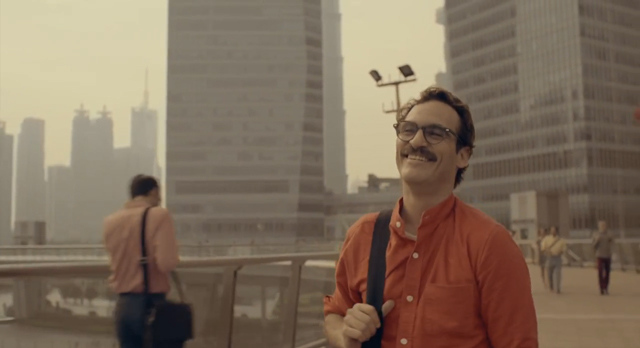 Her, the latest from writer-director Spike Jonze is about as inventive at his Being John Malkovitch – and that’s really saying something. Joaquin Phoenix stars as a lonely guy fascinated by his breathtakingly intuitive new computer operating system (voiced by Scarlett Johannson). This new operating system is SO intuitive that it molds itself to please him, constantly fine tuning itself into the image of his ideal companion – and he falls in love.
Her, the latest from writer-director Spike Jonze is about as inventive at his Being John Malkovitch – and that’s really saying something. Joaquin Phoenix stars as a lonely guy fascinated by his breathtakingly intuitive new computer operating system (voiced by Scarlett Johannson). This new operating system is SO intuitive that it molds itself to please him, constantly fine tuning itself into the image of his ideal companion – and he falls in love.
It’s set in a technologically not-so-distant future (but far enough in the future that everyone in LA lives and works in highrises and takes transit, even to the beach). Along with the absurd premise, Jonze sprinkles in some brilliantly funny touches. There’s a blind date with a knockout (Olivia Wilde) that spirals out of control with stunning suddenness. There’s an inspired bit with a waitperson interrupting the diners with “How’s everything?” (one of my personal pet peeves) at precisely the most awkward moment possible. A video game figure is cuddly looking but shockingly abusive. Here’s one more sly touch – a future male fashion of awkwardly high-waisted pants. Lots of smart laughs.
Her is one of the more thought-provoking films of the year – why did the main character’s most recent relationship fail? Does he really know what he wants and needs? Can he give enough to make a reciprocal relationship work?
Joaquin Phoenix is very good, as are Wilde, Kirsten Wiig, Chris Pratt, Rooney Mara and Amy Adams. Scarlett Johannson, however, is a revelation; equipped only with her husky voice, she dominates the film. It’s an extraordinary performance.
All this being said, Her is not a perfect film – it drags in places. But between Johannson’s performance and Jonze’s wacky but thought-provoking story, Her is a winner – and on my Best Movies of 2013.
THE PAST: life resists our desire to make everything tidy
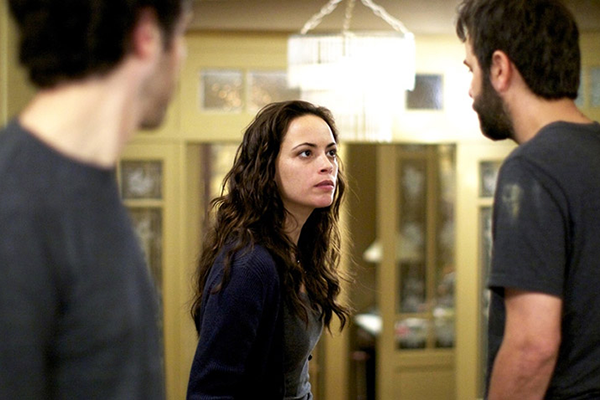 In the French movie The Past, a French woman has requested that her estranged husband return from Iran to expedite their divorce; he obliges and walks into a family life that gets messier by the minute. Why does she suddenly want the divorce right now? Can she marry her current boyfriend? Who are the fathers of all of her kids? What happened to her current boyfriend’s wife – and why? As the answers are revealed one-by-one, our understanding of the events and characters evolve.
In the French movie The Past, a French woman has requested that her estranged husband return from Iran to expedite their divorce; he obliges and walks into a family life that gets messier by the minute. Why does she suddenly want the divorce right now? Can she marry her current boyfriend? Who are the fathers of all of her kids? What happened to her current boyfriend’s wife – and why? As the answers are revealed one-by-one, our understanding of the events and characters evolve.
This shifting viewpoint is similar that into writer-director Asghar Farhadi’s Oscar-winning Iranian film A Separation, which I summarized as “brilliant film/tough to watch”. Farhadi’s art reflects life at its messiness – especially how life resists our desire to make everything tidy and symmetrical. It all makes for a compelling drama – we care about each character and what’s going to happen. Each development further complicates the story – all the way up to the movies final shot, which adds another pivotal complication.
The Artist’s Berenice Bejo won Best Actress at Cannes for playing the woman completely overstressed by the pressures that her own choices have brought upon her; (her careworn character is just about 180 degrees from Peppy Miller in The Artist). The acting is uniformly excellent, and especially by the child actors.
One more thing – in writing and directing the part of the teenage daughter, Farhadi shows that he has a superb understanding of teenage girls. He captures the mix of self-absorption, volatile unpredictability and the paradoxical yearning for both independence and parental protection, while avoiding turning the character into a sitcom brat. Indeed, he’s done it before, having directed his own teenage daughter to an excellent performance in A Separation. This is one of his most notable gifts as a filmmaker.
The realism of The Past may cause some viewers to reflect on their own family drama, so not everyone will find it enjoyable. Nevertheless, it’s an admirable and thought-provoking story told so very well – right up to that final shot.
AIN’T THEM BODIES SAINTS: absorbing and unforgettable
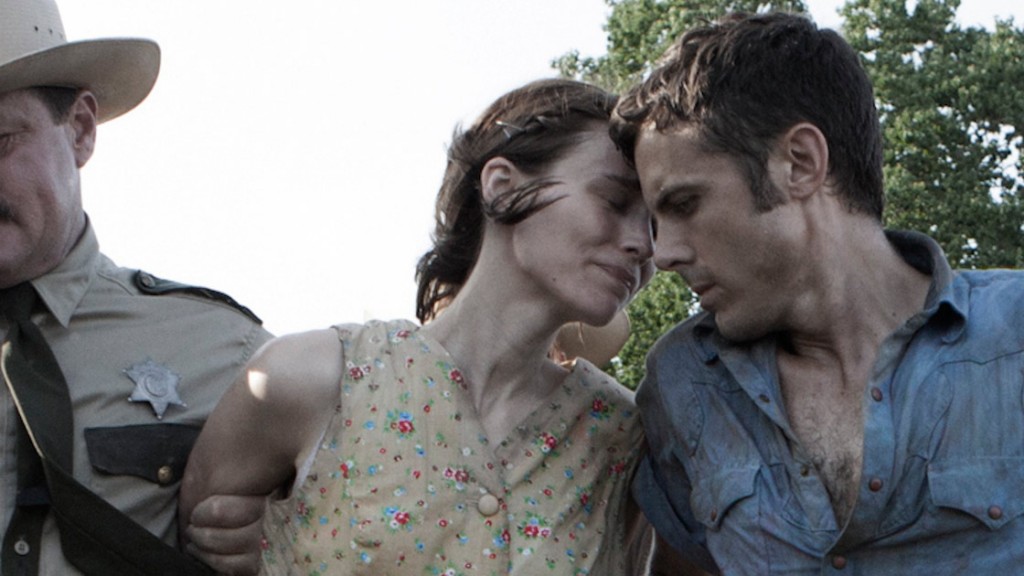
The skeleton of the story in Ain’t Them Bodies Saints is simple – a Texas prison escapee goes looking for his wife and kid. But that capsule understates the totality of Ain’t Them Bodies Saints, an atmospheric romantic drama that is superbly written, directed, acted and scored.
Every filmmaker should watch the first ten minutes of Ain’t Them Bodies Saints for its extremely economic story-telling, which lets the audience piece together the setting and the cores of the characters without obvious exposition. Bob and Ruth are young lovers, and Ruth is pregnant. They are involved in a crime, for which Bob goes to prison before their child is born. When the daughter is four, he escapes from prison and everyone – Ruth, Bob’s old crime partners, the community and the cops – know that he’s headed back to Ruth. Both the cops and the criminals are awaiting – the story follows the path to the inevitable conflict.
The characters are unforgettable. Bob, played with ferocity by Casey Affleck (Gone Baby Gone and The Assassination of Jesse James blah blah), has an obsession to reunite with Ruth and the daughter he has never seen. He has framed this quest as his moral obligation to take care of his family – but, of course, they would be better off without him and the trouble he will bring. He’s not really capable of nobility, but he doesn’t know that.
Ruth has a profound passion for Bob, and she owes him for taking the fall for her. But, despite her loyalty, she is entirely realistic about the consequences of his return. We see Ruth’s steely determination and wilfulness in yet another searing performance by Rooney Mara (The Social Network, The Girl with the Dragon Tattoo).
The complexity of the secondary characters contribute to the compelling story. With an unsettling mixture of decency and creepiness, the local cop (Ben Foster, equally good in The Messenger and Rampart) becomes very attentive to Ruth and her daughter. He had been wounded at Bob and Ruth’s capture, seems to be genuinely interested in the welfare of the little daughter and also clearly has a thing for Ruth.
Ruth has also been helped by a fatherly gentleman storekeeper (Keith Carradine), whom we later learn is the local crime lord. His actions seem rooted in all the right values, but, given his criminality, how benevolent can he really be? As a leading man, Carradine had an impressive run in the 70s where he starred in Robert Altman’s Nashville, Ridley Scott’s The Duellists and Louis Malle’s Pretty Baby, all within three years. Now with 128 screen credits, Carradine’s performance here perfectly strikes every note.
Ain’t Them Bodies Saints looks beautiful – much like a Terence Malick film without all the confusion and boring parts. I also liked Daniel Hart’s atmospheric but unobtrusive music.
Ain’t Them Bodies Saints is completely absorbing – and that doesn’t happen by accident. This is writer-director David Lowery’s first feature with a theatrical release. Who is this guy? Lowery edited two recent indies that I criticized for other reasons, Upstream Color and Sun Don’t Shine, but in which his editing was remarkable. It’s clear from Ain’t Them Bodies Saints that Lowery is a major talent.
So there you have it – a gripping story with brilliant performances by Rooney, Affleck, Carradine and Ben Foster in the debut of a promising filmmaker.
What does the title mean? I have no idea. And I hope that Lowery lets someone else name his next exceptional movie.
RENDEZ-VOUS IN KIRUNA: roadtrip to redemption
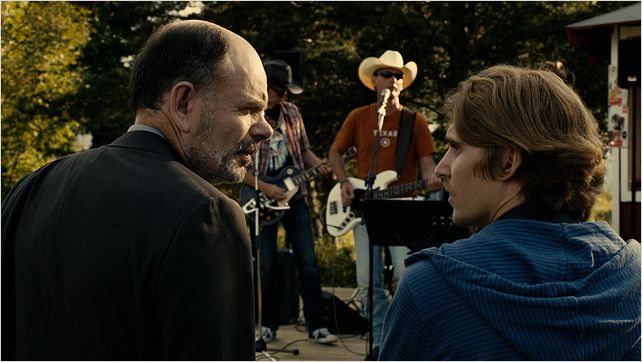 In Rendez-vous in Kiruna, a curmudgeonly Parisian architect (Jean-Pierre Daroussin) takes a journey of grim obligation to northern Sweden. He picks up a young Swedish lost soul (Anastasios Soulis), and a road trip filled with funny moments ensues.
In Rendez-vous in Kiruna, a curmudgeonly Parisian architect (Jean-Pierre Daroussin) takes a journey of grim obligation to northern Sweden. He picks up a young Swedish lost soul (Anastasios Soulis), and a road trip filled with funny moments ensues.
Their tangles with cuckolded bikers and the random moose are funny, making it bearable to explore the movie’s underlying theme – the abandonment (literal or emotional) of sons by their fathers. Rendez-vous in Kiruna was co-written by its director Anna Novion and its cinematographer, Anna’s father Pierre Novion. At French Cinema Now, Pierre Novion noted that all the characters are abandoned people. Novion went on to say that he works well with his daughter, but that he is the son of his father (and hence familiar with the tension of the father-son dynamic.)
I always love Jean-Pierre Daroussin, and here he gets to play a misanthropic Master of the Universe instead of one of his usual lovable losers. He’s very, very good. So is Claes Ljunmark, as another frustrated father figure.
The most riveting performance, however, is the monologue by Tord Peterson as the young Swede’s grandfather. Daroussin’s character doesn’t understand any of the words of the grandfather’s speech – but he gets the essential truth. It’s a wonderful moment – one of the most powerful on film this year.
The journey reaches its conclusions without any cheap or sappy sentimentality. But there is a moment of realization and an opportunity for redemption that make Rendez-vous in Kiruna one of the year’s most satisfying movies. If there’s any justice in the world of movie distribution (I’m asking for a lot here), there will be an US theatrical release. Please.
THE GATEKEEPERS: winning tactics make for a losing strategy
This Israeli documentary is centered around interviews with all six surviving former chiefs of Shin Bet, Israel’s super-secret internal security force. We get their inside take on the past thirty years of Israeli-Palestinian history. What is revelatory however, is their assessment of Israel’s war on terror. These are hard ass guys who went to the office every morning to kill terrorists. But upon reflection, they conclude that winning tactics make for a losing strategy.
Filmmaker Dror Moreh also makes file footage pop off the screen with 3D effects, and shows us the night vision helmet cam view of an Israeli military raid on a houseful of terrified Palestinians. It’s powerful stuff, and a Must See for anyone with an interest in the Israeli-Palestinian conflict or the American War on Terror.
AT ANY PRICE: psychological drama on the corporate farm
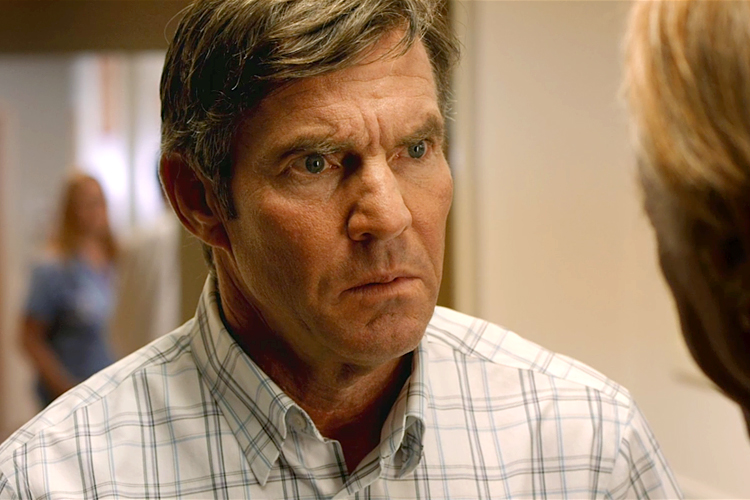
At Any Price is – at long last – a movie about today’s Farm Belt that farmers will recognize. American cinema has been romanticizing the small family farm for at least a quarter century since, to survive, US farmers have moved on to industrial scale agribusiness (with all its tradeoffs). The corporate farmer at the center of At Any Price is Henry Whipple (Dennis Quaid). Henry is a driven man, consumed by a need to have the biggest farm and to sell the most genetically modified corn seeds in southern Iowa. Henry is also stupendously selfish, utterly tone-deaf to the needs of anyone else.
Despite Henry’s dream to hand the business to one of his two sons, they despise him. The older son has avoided conflict by escaping to a vagabond life in international mountain climbing. The younger son, Dean (Zac Efron), plans his escape as a NASCAR driver and seems well on his path. Stuck on the farm for now, he can barely tolerate his father’s incessant grasping. But he’s small town royalty, he’s got a pretty girlfriend (Maika Monroe) and he’s as good-looking as Zac Efron, so life isn’t unbearable.
But Henry’s smug perch on top of the haystack is not as impregnable as it would seem. Along the way, he has cut some corners and stepped on other people, and it catches up to him. Henry’s empire threatens to topple, Dean clutches at his big career chance, and the two men – each and together – must react to developments that they never saw coming. Writer-director Ramin Bahrani spins a deeply authentic psychological drama as each man is forced into some uncomfortable self-examination.
It’s interesting that such a realistic exploration of New Agriculture in Middle America comes from Bahrani. Himself North Carolina-born, he has used nonprofessional actors to make three brilliant movies about struggling immigrants in America: Chop Shop, Man Push Cart and Goodbye, Solo. Goodbye, Solo was #5 on my list of Best Movies of 2009. Here’s a recent interview with Bahrani in the New York Times touching on At Any Price.
One of Bahrani’s insights is that the impacts of today’s capitalism aren’t necessarily from the malevolently rapacious (like Henry F. Potter in It’s a Wonderful Life), but from the indifference of the selfish. With almost every step that he takes, Henry Whipple screws other folks, but he’s convinced himself that he’s a prince of a guy.
At Any Price is a showcase for Quaid and Efron. Quaid’s portrayal of Henry is brilliantly textured, projecting a self-righteous bluster which barely masks the desperation threatening to erupt through his pores. And I’ve come to always look forward to seeing Efron, who, in Me and Orson Welles, The Paperboy and Liberal Arts, has proven that he is more than just the pretty boy of High School Musical.
Bahrani’s actors have taken full advantage of his screenplay. The character of Dean’s girlfriend is especially well-written. Beginning as a simple teen from a broken family looking for some fun, her journey takes several surprising turns. The actress Maika Monroe pulls it off with a memorable performance. In many ways, the story is anchored by Kim Dickens (Deadwood, Treme) as Henry’s wife and Zac’s mom, resolutely dragging her men out of their self-created sinkholes. Veteran character actor Clancy Brown (the guy has 209 acting credits on IMDb) is superb as Henry’s chief rival.
We are left with two men who finally must appreciate who they really are, whether we like them or whether they like themselves. After seeing At Any Price, I didn’t leave the theater thrilled, but that’s probably because a brilliant examination of two ambiguous men is more thought-provoking than stirring. And there’s nothing wrong with that.
UNDEFEATED: an Oscar winner you haven’t seen
The extraordinary documentary Undefeated begins with a high school football coach addressing his team:
Let’s see now. Starting right guard shot and no longer in school. Starting middle linebacker shot and no longer in school. Two players fighting right in front of the coach. Starting center arrested. Most coaches – that would be pretty much a career’s worth of crap to deal with. Well, I think that sums up the last two weeks for me.
Undefeated is the story of this coach, Bill Courtney, leading his team through a season. The kids live in crushing poverty and attend a haplessly under-resourced high school in North Memphis.
Undefeated may be about a football team, but isn’t that much about football. Instead of the Xs and Os, it shows the emotional energy required of Courtney to keep each kid coming to school, coming to practice and on task. He gets many of the kids to think about goals for the first time in their lives. He is tireless, dogged and often frustrated and emotionally spent.
The film wisely focuses on three players, and we get to know them. Like the rest of the team, all three are from extremely disadvantaged homes. One is an overachiever both on the field and in the classroom, but surprisingly emotionally vulnerable. Another has college-level football talent but very little academic preparation. The third, recently back from youth prison, is impulsive, immature, selfish and extremely volatile.
Undefeated won the 2012 Oscar for Best Documentary for filmmakers Daniel Lindsay and T.J. Martin – but it didn’t get a wide theatrical release. It’s on my Best of 2013 list because it is finally available to most Americans on DVD and streaming from Netflix Instant, Amazon VOD and others.
IN A WORLD…: the year’s best comedy
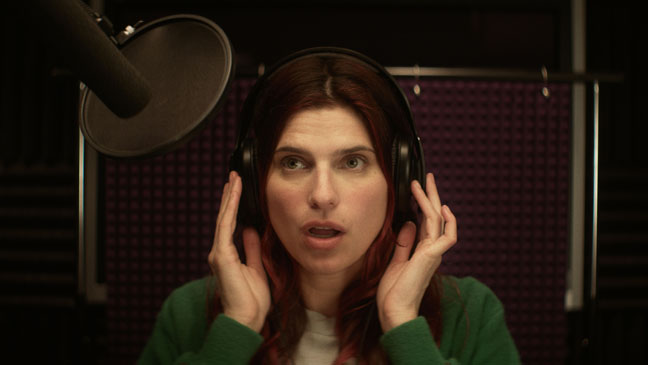
Actress Lake Bell wrote/directed/stars in In a World…, the story of an underachieving voice coach who still lives in the house of her dad, the king of movie trailer narration. She’s disheartened when he kicks her out to make room for his new and very young squeeze, but she lucks into a voiceover gig herself and is “discovered” as the hot new talent. In fact, she’s up for the most prestigious new payday when she finds out that her dad is not as supportive as one might expect…
Here’s why In a World… is so damn good – Bell has written a very funny comedy about a generational rivalry and woven it together with a Hollywood satire, an insider’s glimpse into the hitherto under-the-radar voiceover industry and a romantic comedy. The romantic comedy thread, in which our heroine is oblivious to the nice guy who really likes her, is better by itself than most romantic comedies. But we also get many LOL moments among the self-absorbed and back-stabbing Hollywood set. Plus there’s a very sweet story of the relationship between the protagonist’s sister and her hubby – that could stand alone and be better than a lot of indies as well..
Bell gets most of the laughs from the foibles of the characters and from really intelligently crafted dialogue. But she know how to pull off a physical gag, too. At one point, our heroine wants to be kissed by a handsome Hollywood bigshot, but when it happens, his technique is to put her entire nose into his mouth – and her surprise and discomfort is very funny.
Fortunately, Bell was able to cast Fred Melamed, a distinguished voiceover artist, as the father. Melamed has been the voice of CBS Sports, the Super Bowl, the Olympics and Mercedes-Benz. He’s also a brilliantly funny actor. I called Melamed’s performance as the hilariously pompous and blatantly manipulative Sy Ableman in A Serious Man “the funniest movie character of the decade”.
Bell’s previous roles have been secondary parts that have taken advantage of her unconventionally severe beauty. You may remember Bell as Alec Baldwin’s new trophy wife in It’s Complicated. Having written it herself, she finally has a role in which she can show her comic chops. I turns out that she’s a gifted comic actress, with screwball timing, a rich take and a knack for physical comedy.
The rest of the cast is uniformly good. I especially enjoyed Rob Corddry (Warm Bodies) as the long suffering husband of the sister.
In a World… is a complete and winning film. It’s already almost September, and so far, In a World… is the year’s best comedy.
ME AND YOU: looking for solitude, finding adventure
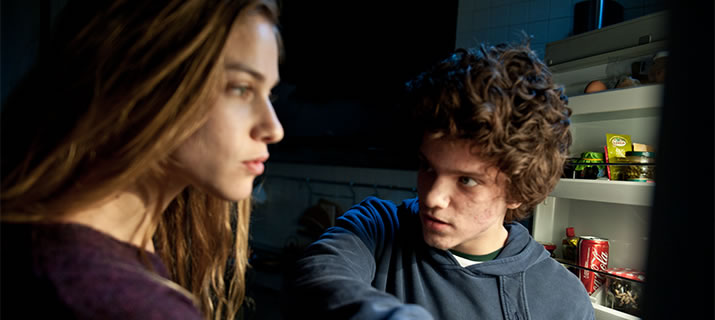
In the Italian coming of age dramedy Me and You, we meet fourteen-year-old Lorenzo with his pimply face, see through mustache and bad attitude. Lorenzo lives with his mom in a comfortable Rome apartment and yearns for some low-pressure solitude. Telling his mom that he’s off to a weeklong ski holiday with schoolmates, he instead hides out in their apartment’s basement storage unit. He has stocked the basement with his favorite foods, it has a bathroom and he can listen to his tunes on headphones. It’s all looking up for him until his heroin-addicted older half-sister Olivia intrudes, looking for a place to go cold turkey.
Lorenzo resents the intrusion, but Olivia threatens to tell his mom. It turns out that the two don’t really know each other. (Lorenzo’s dad had left Olivia’s mom for his mom – and the two mothers don’t communicate.) The siblings bicker. As any 14-year-old would be, Lorenzo is fascinated by this young woman. Still immature herself, she has already lived a life – and there’s much Lorenzo can learn about the adult world from Olivia. Perhaps they can even bond for the first time as brother and sister…Lorenzo isn’t going to get his solitude, but he may get an unforgettable adventure instead.
There’s a lot of humor in Me and You, primarily stemming from the ski trip ruse and the sibling interactions. Me and You also contains a very realistic and unvarnished depiction of detox and relapse.
This is 72-year-old Italian director Bernardo Bertolucci’s first film since The Dreamers in 2003 (my choice for the best film of that year). Bertolucci, of course, is the writer-director of Last Tango in Paris (which I don’t think holds up well today) and The Conformist, 1900, The Last Emperor and The Sheltering Sky (which still stand up as excellent films). With The Dreamers and Me and You, Bertolucci seems to be matching his finest work.
I saw Me and You at the San Francisco International Film Festival; it is still waiting for a US theatrical release.


3 thoughts on “Best Movies of 2013”